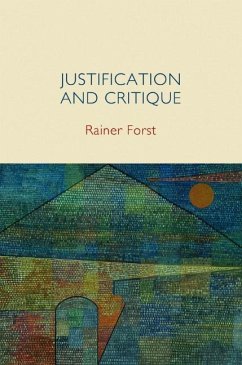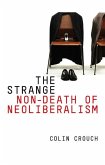Rainer Forst develops a critical theory capable of deciphering the deficits and potentials inherent in contemporary political reality. This calls for a perspective which is immanent to social and political practices and at the same time transcends them. Forst regards society as a whole as an 'order of justification' comprising complexes of different norms referring to institutions and corresponding practices of justification. The task of a 'critique of relations of justification', therefore, is to analyse such legitimations with regard to their validity and genesis and to explore the social and political asymmetries leading to inequalities in the 'justification power' which enables persons or groups to contest given justifications and to create new ones.
Starting from the concept of justification as a basic social practice, Forst develops a theory of political and social justice, human rights and democracy, as well as of power and of critique itself. In so doing, he engages in a critique of a number of contemporary approaches in political philosophy and critical theory. Finally, he also addresses the question of the utopian horizon of social criticism.
Starting from the concept of justification as a basic social practice, Forst develops a theory of political and social justice, human rights and democracy, as well as of power and of critique itself. In so doing, he engages in a critique of a number of contemporary approaches in political philosophy and critical theory. Finally, he also addresses the question of the utopian horizon of social criticism.
"In his ambitious masterpiece, Toleration in Conflict, Rainer Forst laid the groundwork for an innovative concept, the right to justification. Here, he has developed this prolific idea further in a systematic manner, establishing a compelling and original political theory. Forst, a brilliant scholar, deserves his reputation as one of the leading political philosophers of his generation."
Jürgen Habermas
"In this inspiring book, Rainer Forst covers a wide range of important problems in contemporary moral and political philosophy, including the relation between recognition and distribution, the normative foundations of toleration and human rights, and the best way to understand human dignity. His ambition is to resolve these problems in a unified way by reflecting on the conditions under which persons stand in relations of reciprocal and general justification to one another. Elegant and synoptic, this work exemplifies and advances the exciting confluence between Anglophone and German political philosophy."
Thomas Pogge, Yale University
"Rainer Forst is one of the most penetrating social and political theorists writing today. In these essays, he further elaborates his theory of 'reflexive justification' in relation to questions of just rule, legitimation, and domination. The essays sparkle with insight and clarity."
Seyla Benhabib, Yale University
Jürgen Habermas
"In this inspiring book, Rainer Forst covers a wide range of important problems in contemporary moral and political philosophy, including the relation between recognition and distribution, the normative foundations of toleration and human rights, and the best way to understand human dignity. His ambition is to resolve these problems in a unified way by reflecting on the conditions under which persons stand in relations of reciprocal and general justification to one another. Elegant and synoptic, this work exemplifies and advances the exciting confluence between Anglophone and German political philosophy."
Thomas Pogge, Yale University
"Rainer Forst is one of the most penetrating social and political theorists writing today. In these essays, he further elaborates his theory of 'reflexive justification' in relation to questions of just rule, legitimation, and domination. The essays sparkle with insight and clarity."
Seyla Benhabib, Yale University








